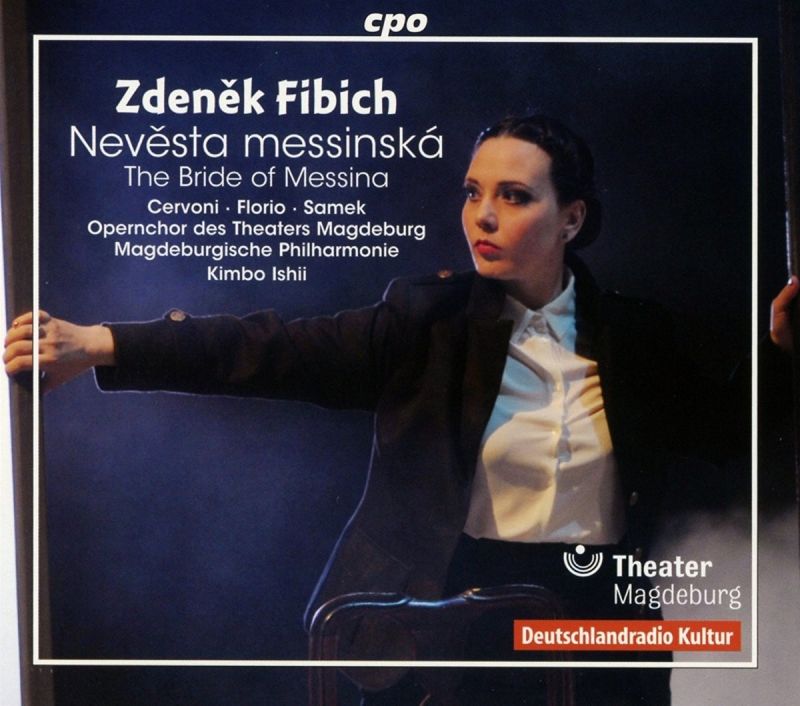FIBICH The Bride of Messina
View record and artist detailsRecord and Artist Details
Composer or Director: Zdenek (Antonín Václav) Fibich
Genre:
Opera
Label: CPO
Magazine Review Date: AW16
Media Format: CD or Download
Media Runtime: 119
Mastering:
DDD
Catalogue Number: CPO777 981-2

Tracks:
| Composition | Artist Credit |
|---|---|
| (The) Bride of Messina |
Zdenek (Antonín Václav) Fibich, Composer
Hale Soner, Page Johannes Stermann, Diego Kimbo Ishii, Conductor Luca Cervoni, Donna Isabella Magdeburg Philharmonic Orchestra Manfred Wulfert, Bohemund Martin-Jan Nijhof, Kajetán Noa Danon, Beatrice Opera Chorus of the Magdeburg Theatre Richard Samek, Don Cesar Thomas Florio, Don Manuel Zdenek (Antonín Václav) Fibich, Composer |
Author: Mark Pullinger
Donna Isabella, mourning the death of her husband, the King of Messina, attempts to reconcile her two feuding sons. Each plans to bring his future bride to the castle for his mother’s approval, while Isabella reveals that they have a long lost sister, who has been securely hidden in a convent because the King had once had a dream that she would cause the deaths of her two brothers. No prizes for guessing that their sister Beatrice turns out to be the woman César is secretly in love with, but has been abducted from the convent by Manuel as his own bride-to-be. César slays his brother, then, when the truth is revealed, kills himself.
Fibich’s operas haven’t enjoyed the success of those by his compatriots Smetana and Dvořák, partly because they share few Czech references – there are few of the Bohemian folk melodies or dance rhythms which course through operas such as The Bartered Bride or Rusalka. He had an international outlook, also taking inspiration from Shakespeare and Byron. Fibich’s early operas were written in German and he was sometimes nicknamed ‘the Czech Wagner’. The Bride of Messina, composed in 1882 83, is through-composed and assigns leifmotifs to characters. Critics dismissed it as either too German, too Wagnerian or too gloomy and it lasted just seven performances. There is a recording on Supraphon but the Magdeburg performance here was the first to take place outside the Czech Republic.
For a small German house, the casting is very decent. As Isabella, mezzo Lucia Cervani is good, with a solid upper register. Noa Danon’s Beatrice is strained at times and not always ideally steady – no match for the glorious Gabriela Beňačková on Supraphon. The brothers are well cast. Richard Samek has a nice ring to his tenor and stays the course well to the bitter end, while Thomas Florio’s gritty baritone makes much of the character of Manuel. Fibich writes few ensembles, but the chorus is given plenty to do and the Magdeburg Theatre Opera Chorus acquits itself well. Kimbo Ishii brings a fine sweep to Fibich’s score, coming in around 15 minutes faster than Franti≈ek Jílek, although he makes a minor cut to the noble, brassy funeral march.
The live recording doesn’t suffer from too much stage noise and the booklet contains a full libretto and translation, albeit in minuscule print.
Discover the world's largest classical music catalogue with Presto Music.

Gramophone Digital Club
- Digital Edition
- Digital Archive
- Reviews Database
- Full website access
From £8.75 / month
Subscribe
Gramophone Full Club
- Print Edition
- Digital Edition
- Digital Archive
- Reviews Database
- Full website access
From £11.00 / month
Subscribe
If you are a library, university or other organisation that would be interested in an institutional subscription to Gramophone please click here for further information.




